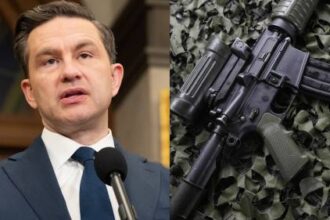The tense standoff between pro-Palestinian and pro-Israeli demonstrators at Concordia University escalated dramatically yesterday, forcing administrators to shutter the downtown Montreal campus after police arrested two individuals amid growing security concerns. This marks the fifth major confrontation at the university this academic year, highlighting the deepening polarization that continues to affect Canadian campuses long after the initial outbreak of the Israel-Hamas conflict.
“What began as a peaceful demonstration quickly deteriorated when counter-protesters arrived,” said Montreal Police Commander Marie Tremblay. “Officers intervened when physical altercations broke out between the groups, resulting in two arrests for assault and inciting violence.”
The protests began around noon when approximately 200 pro-Palestinian students gathered in the Henry F. Hall Building atrium, calling for the university to divest from companies they claim have ties to Israel’s military operations. Within hours, a smaller group of about 70 pro-Israeli demonstrators arrived, leading to heated verbal exchanges that eventually turned physical.
University President Katherine Richardson announced the immediate closure of the downtown campus through an emergency alert system. “The safety of our students and staff remains our paramount concern,” Richardson stated in a subsequent press release. “We acknowledge the right to peaceful protest, but cannot tolerate actions that threaten the wellbeing of our community members or disrupt academic activities.”
This incident follows similar confrontations at universities across Canada, including recent protests at the University of Toronto and McGill University. What distinguishes the Concordia situation, according to political science professor Dr. Daniel Bernstein, is the intensity of the confrontations. “Montreal’s diverse population and the significant Jewish and Arab communities create a particularly charged atmosphere for these debates,” Bernstein told CO24 News.
Student reaction has been mixed. Sarah Khalid, a third-year sociology student who participated in the pro-Palestinian demonstration, expressed frustration with the university’s response. “They’re silencing legitimate political expression instead of addressing our concerns about institutional complicity,” she said.
Meanwhile, David Cohen, president of Concordia’s Jewish Student Association, defended the counter-protest. “We have repeatedly faced intimidation and harassment on campus when expressing support for Israel. Today we simply wanted to be heard,” Cohen explained to CO24 Canada.
Montreal Mayor Valérie Plante has called for dialogue between the groups, announcing plans for a community forum next week. “Our city has always been a place where diverse perspectives can coexist peacefully. We must find a way back to that tradition,” Plante stated during an emergency press conference.
The university administration has scheduled a series of mediated discussions between student groups, though skepticism remains about their effectiveness. Campus security has been enhanced, with additional measures being implemented before classes resume.
As Canadian universities continue navigating these deeply divisive issues, the fundamental question remains: how can academic institutions balance their commitment to free expression with their responsibility to maintain safe learning environments when global conflicts become intensely local struggles?













